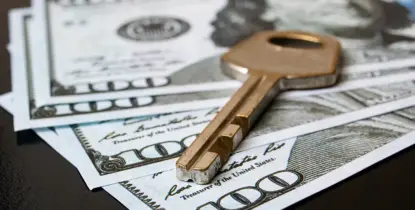
Can I Get a Payday Loan in Another State?
14 Min Read
- Key takeaways
- How “out-of-state” payday loans actually work
- Does your home state or current location set the rules?
- Payday loan laws by state at a glance
- How to check a lender’s license and compliance history
- Eligibility and documents you will likely need to apply
- Payday loan costs, risks, and your rights
- Legal alternatives when payday loans are prohibited
- How to choose a legitimate loan lender
- FAQ
Key Takeaways
- Each state has different payday loan laws and regulations. Some of them set specific limits and APR caps, while others prohibit them entirely.
- Lenders must have valid licenses to operate in the particular area and ask for proof of address in the state where you apply.
- Online payday loans can be obtained out of state, but your home state’s laws still apply and govern the terms.
- Your physical presence in the state where payday lending is banned can affect your approval, even if payday loans are permitted in your home state.
Applying for a payday loan is quite straightforward when it is legal in your home state. However, it can be challenging once financial emergencies strike across its lines. While it may be possible to get a payday loan out of state, you may face strict limits or prohibitions associated with different local regulations. In this guide, we explore specific cases where getting a payday loan in another state is possible and provide several alternatives for states that consider small loans illegal.
How “Out-of-State” Payday Loans Actually Work
Out-of-state payday loans provide remote access to borrowing when you are not in the state where your permanent address is. However, it is only possible if payday lending is legal in your home state. This way, you need to find an online loan provider that is licensed to operate in your place of residence and complete a simple application form on the lender’s website.
A loan decision is usually made in minutes and sent to you via email. If approved, you need to e-sign the loan agreement to receive the funds. The money is usually transferred directly to your bank account within 1 business day.
Does Your Home State or Current Location Set the Rules?
When you apply for a payday loan, your home state’s laws and regulations still apply, no matter your current location. This means that crossing the borders won’t help you get the loan if it is banned in your state of residence. However, your physical presence can affect your approval and add several challenges, even if payday lending is allowed in your home state. Let’s take a look at some specific cases.
If you are in a legal state
There are two general scenarios to consider in this situation. If payday loans are legal in both your state of residence and the state of your physical presence, you may still get one online. Lending rules, regulations, and limits of your home state will apply. If payday loans are banned in your home state but allowed in the state where you are temporarily located, you will not be able to get one.
If you are in a restricted state
Being in a state where payday loans are prohibited may bring several challenges in the application process or ban you from getting approved. Even if payday lending is legal where you permanently reside, your online application may not go through as long as you are in a state that prohibits small loans. This happens because lenders often apply geo blocks and restrict applications based on your IP address location.
If you recently moved or changed your address
If you actually moved to the state where payday loans are legal, you can get one as long as you can provide valid proof of address. This typically includes a utility bill, lease agreement, mortgage statement, or the new state’s ID or driver’s license.
Payday Loan Laws by State at a Glance
Each state has its own rules and limits regarding payday loans. Here’s a quick overview:
- Loan amounts: $100 to $1,000 in most cases. Some states tie the maximum to a certain percentage of your monthly income. A few states have higher limits.
- Repayment periods: 7 to 31 days, with an average term of 14 days. The due date is usually set by your next paycheck. Extended payment plans are mandatory in some states.
- APRs: 260% to over 700%. An average payday loan APR is 391.07%. Some states cap the maximum interest rate at 36% or less.
- Fees and other charges: origination fees of up to 10% may apply. Lenders may charge NSF fees for late payments.
States Where Payday Loan Are Illegal
Payday loans are allowed in 35 states and prohibited in 15 states, Puerto Rico, and the District of Columbia. The following states and territories entirely prohibit payday lending or ban it in its traditional form:
- Arizona
- Arkansas
- Connecticut
- District of Columbia
- Georgia
- Hawaii
- Massachusetts
- New Jersey
- New Mexico
- New York
- North Carolina
- Oklahoma
- Pennsylvania
- Puerto Rico
- Vermont
- Virginia
- West Virginia
What States Allow Payday Loans
The table below provides a breakdown of states that allow payday loans, along with their limits and finance charges:
| State | Maximum Loan Amounts | Maximum Finance Charges |
|---|---|---|
| Alabama | $500 | 17.5% per loan |
| Alaska | $500 | 15% of the loan amount |
| California | $255 | $17.64 per $100 |
| Colorado | $500 | 36% APR cap plus origination fees and monthly maintenance fees |
| Delaware | $1,000 | No limit |
| Florida | $500 | 10% of the advanced amount plus a $5 verification fee |
| Idaho | $1,000 or 25% of your monthly income | No limit |
| Illinois | $1,000 or 25% of your monthly income | 36% APR cap |
| Indiana | $825 or 20% of your gross monthly income | 10% – 15%, depending on the amount you borrow (maximum $99.5 for a $825 loan) |
| Iowa | $500 | $15 on the first $100 and $10 on subsequent $100 |
| Kansas | $500 | 15% of the amount of the cash advance |
| Kentucky | $500 | $15 per $100 borrowed plus $1 database fee |
| Louisiana | $350 | 16.75% of the amount borrowed (maximum $45) |
| Maine | $2,000 | 30% of the unpaid balance |
| Maryland | $1,000 | 33% APR cap (2.75 per month) |
| Michigan | $600 | 11% – 15%, depending on the loan amount |
| Minnesota | $350 | 50% APR cap |
| Mississippi | $410 | $20 per $100 for loans of up to $250 and $21.95 for each $100 of loans with face check amounts of $251 to $500 |
| Missouri | $500 | 75% of the borrowed amount |
| Montana | $300 | 36% APR cap |
| Nebraska | $500 | 36% APR cap |
| Nevada | 25% of your gross monthly income | No limit |
| New Hampshire | $500 | 36% APR cap |
| North Dakota | $500 | 20% of the loan amount |
| Ohio | $500 | 60% of the originally contracted loan amount |
| Oregon | 25% of your gross monthly income | 36% APR cap plus a one-time origination fee of the lesser of 10% of the advanced amount or $30 |
| Rhode Island | $450 | 10% of the advanced amount |
| South Carolina | $550 | 15% of the advanced amount |
| South Dakota | $500 | 36% APR cap |
| Tennessee | $425 | $17.65 for every $100 borrowed |
| Texas | Not specified | No limit |
| Utah | Not specified | No limit |
| Washington | $700 or 30% of your gross monthly income | 15% for the first $500 borrowed and 10% for the amount over $500 |
| Wisconsin | $1,500 or 35% of your gross monthly income | No limit |
| Wyoming | $400 | 15% per month or 36% per annum |
How to Check a Lender’s License and Compliance History
Licensing information must be provided at the lender’s location and/or on the website. Alternatively, you can check with your state regulator or look up the company in NMLS Consumer Access. To review the compliance history, use the CFPB Consumer Complaint Database. Also, check out whether the lender was involved in any disciplinary actions by looking at your state regulator’s enforcement page or the CFPB enforcement list.
Eligibility and Documents You Will Likely Need to Apply
Payday loans are known for being quite easy to get. While each lender may have their own unique criteria, here are the basic requirements you typically need to meet to qualify:
- Be at least 18 years old
- Be a permanent US resident or legal citizen
- Have an active bank account in your name
- Provide proof of income and address
To support your application, you need to provide the following documents and information:
- Valid government-issued photo ID
- Social Security number
- Bank account and routing numbers
- Proof of income (pay stubs, bank statements, 1099 forms, tax returns)
- Proof of address in the state you apply in (utility bills, lease agreement, mortgage statement, affidavit of residency)
- Valid email and cell phone number
Payday Loan Costs, Risks, and Your Rights
A payday loan cost is typically expressed in a flat fee, which is $10 to $30 for each $100 borrowed. This results in high APRs, often ranging from 260% to over 700%. Short repayment terms keep these loans relatively affordable but also make them difficult to handle.
All this creates potential for rollovers, which involve extra fees and can result in a debt cycle. Therefore, many states regulate payday loans strictly and set limits on amounts, fees, repayment terms, and the number of renewals allowed.
Even if you apply for a payday loan from another state, consumer protections from your state of residence remain in effect. Before you apply, check out your state’s rules and regulations regarding payday loans to ensure the lender doesn’t violate them. If you become a victim of predatory lending, report the abuse to the Consumer Financial Protection Bureau or your state attorney general’s office.
Legal Alternatives When Payday Loans Are Prohibited
If payday lending is illegal in your state of residence, you can consider a few more emergency options that might suit people with bad credit.
Installment Loans
This option allows you to get a lump sum amount on hand and repay it with interest over an extended period in fixed monthly payments. At 1F Cash Advance, you can borrow up to $5,000 for a period of 2 to 24 months. Interest rates start as low as 16% but may be higher for borrowers with bad credit.
Personal Loans
Personal loans are typically offered by banks and online lenders. Loan amounts range from $1,000 to $50,000, with the repayment over 12 to 84 months in fixed monthly installments. Banks typically require good credit and may ask you to provide collateral or a co-signer if your FICO rating is low. Online lenders may accept applicants with less-than-perfect scores.
Credit Union Loans
Certain credit unions offer payday alternative loans (PALs) that serve as cheaper and flexible alternatives to regular payday loans. With a PAL, you can borrow up to $2,000 for a period of 1 to 12 months. Interest rates are capped at 28%. To apply, you need to be a credit union member. A hard credit check is typically performed, but good credit is not needed to qualify.
Cash Advance Loans
Cash advance loans provide you with a portion of your future paycheck upfront after assessing your income. Loan amounts are usually small, ranging from $50 to $250 or rarely $500. Many apps offer interest-free options that are due on your next paycheck. Express, membership, and subscription fees may apply. To get the loan, you need to install a specific cash advance app on your device, link your bank account to it, and fill out a simple application form.
Pawn Shop Loans
With a pawn shop loan, you can get cash right away against some of your valuable assets. The amount offered is typically a portion of the item’s cost. Your belongings will be physically retained in the pawn shop until you repay the funds. Payback times usually range from 30 to 60 days. Interest is charged daily, and an APR can reach 300%. If you don’t repay the money on time, your pledged asset may be put up for sale.
Car Title Loans
If you own a vehicle, a car title loan allows you to use it as a repayment guarantee and borrow from 25% to 50% of its market price. While you can keep driving the car while it’s pledged, the lender may repossess it if you don’t pay back on time. The repayment terms are usually 15 to 30 days. This, along with a high APR of nearly 300%, makes these loans difficult to handle. Therefore, car title loans may be unavailable in some states, just like payday loans.
Tribal Loans
Tribal loans work like regular payday loans but are controlled by federally recognized Native American tribes. As their lands hold sovereign status, state rules do not apply to them. Therefore, their interest rates may be much higher compared to your state caps. Treat this option with caution and only use it as a last resort.
How to Choose a Legitimate Loan Lender
Before you settle on a particular loan option, make sure it is offered by a trusted loan provider. Here are several parameters to look at:
- Check out licensing information. Review the lender’s website or request a license while at a store. You can also check out this information in NMLS Consumer Access.
- Ensure transparency. Legitimate lenders don’t try to mislead you and provide their terms upfront to help you make an informed financial choice.
- Look at the eligibility criteria. Loan offers that require no proof of income, employment, or identity are likely to be scams. The same applies to options that advertise no credit check or guaranteed approval.
- Watch for signs of predatory lending. Loan offers that seem too good to be true usually come with unclear terms, undisclosed APRs, and extra fees hidden in fine print. Avoid lenders who use aggressive sales tactics, encourage you to lie in your application, or rush you to apply and sign the documents.
- Contact the customer support team. This will help you assess the lender’s customer service and better understand whether you get much-needed assistance in an unforeseen situation.
FAQ
Can I get an online loan in a different state while I’m traveling?
It may be possible to obtain an online payday loan from another state during your travel if these products are allowed in your home state. However, your loan requests may be blocked based on your IP address location if you apply from a state where payday lending is banned.
Do online options still work if payday loans are banned in my state?
Legitimate lenders must comply with your home state’s laws, even if you apply online. Avoid loan providers who offer online payday loans to residents of restricted states, as it may be a sign of a scam.
Can I use my friend’s address in another state?
No, you can’t, since your name must be specified in the document you provide as proof of address.
Do lenders track my location/IP?
Lenders may track your location and IP address when you apply for a payday loan online. This is made to automatically ban loan requests from states where payday lending is illegal. However, not all loan providers have such geo blocks.
Can I get a payday loan in a state where I work or study if it differs from my state of residence?
Lenders usually look at your permanent residence. This means you will not be able to qualify for a loan in the state where you work if you have a physical address there. However, students or temporary residents may qualify if they provide clear documentation of both their permanent and temporary addresses.
I just moved. What proof of address will lenders ask for?
In most cases, you will need to provide a new state’s driver’s license, a utility bill, a lease or rent agreement, or a mortgage statement in your name. If you’re staying with someone and don’t yet have a bill in your name, you can also provide an affidavit of residency.
Can I get two payday loans from different places?
It depends on your state regulations. Some states may allow you to have two or more payday loans at a time from one or different lenders. However, you are likely not able to get a payday loan from lenders that are located in two different states.
Will applying for a payday loan affect my credit?
Most payday lenders perform no hard credit checks via major credit bureaus. This means that applying for a payday loan won’t affect your FICO rating. However, late payments, defaults, and collection actions may result in a credit score drop.
How fast will I get my loan funds across state lines?
When you apply online, lenders usually send the money via a direct deposit into your bank account. Common funding times are as soon as the next business day after approval. Some loan providers may offer same-day funding for applications approved early in the morning on a weekday.
Get a quick payday loan in a few clicks!Apply



